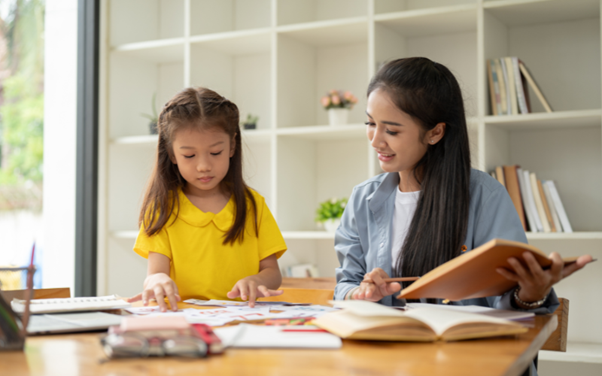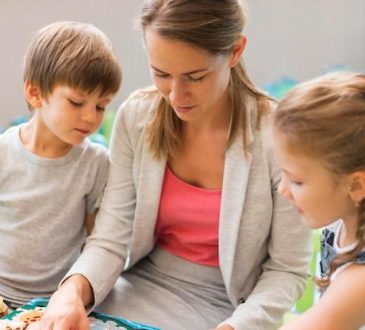
Since young children’s brains are particularly open to new sounds and patterns, this is the best moment for them to begin learning a second language.
Finding the best learning method is then essential for many parents who are eager to help their K1 and K2 children learn Chinese.
Discover some practical tips for teaching your child Chinese and learn the factors to consider when selecting the best Chinese enrichment class in Singapore.
Start with Familiar Words and Phrases
Familiarity is critical for preschoolers. Begin with words and phrases they encounter daily, such as family members’ names, greetings, and simple requests. Consistent exposure to these foundational words builds a strong basis for more complex vocabulary in the future.
- Use common objects like toys, foods, or household items to introduce vocabulary in context.
- Label items in the home in Chinese, such as furniture or appliances, to reinforce learning.
- Practice greetings and common phrases each morning and night, creating a routine that solidifies these words in their minds.
Leverage Visual and Auditory Learning Tools
K1 and K2 children learn best through visual and auditory stimulation. Using resources that combine these elements engages their senses, making learning enjoyable and memorable.
- Flashcards and picture books: Visual aids can help children associate characters with meanings. Invest in a set of colourful flashcards or picture books representing familiar words in both characters and illustrations.
- Songs and rhymes: Children naturally gravitate towards music. Chinese songs, nursery rhymes, and even educational shows that feature catchy tunes and simple vocabulary are excellent tools. Many Chinese preschools incorporate music for this reason.
Encourage Daily Chinese Conversations
Engaging in simple, daily conversations is a valuable way to reinforce Chinese language skills. Even if parents are not fluent, consistent language-use efforts can build a child’s confidence and comfort with speaking Chinese.
- Role-play situations: Create pretend-play scenarios where your child can use Chinese, such as ordering food at a restaurant or shopping.
- Ask and answer questions: Start with basic questions and gradually add more complex structures. For example, ask about their favourite colours, toys, or foods in Chinese.
- Bilingual storytelling: Read a short story in both English and Chinese, encouraging your child to ask questions or repeat phrases.
Enrol in a Reputable Chinese Enrichment Class
Formal classes can offer structured learning that supplements home practice. Focus on programs tailored for preschoolers when searching for the best Chinese enrichment class.
- Choose a curriculum suited to K1 and K2: Look for classes specifically designed for young learners, like K1 Chinese and K2 Chinese. These classes focus on building fundamental language skills through interactive activities.
- Engaging, small-group settings: Smaller class sizes promote personalised attention, allowing children to participate actively. This environment is essential for language acquisition at a young age.
- Experienced instructors: Teachers with expertise in early childhood Chinese education understand how to make language learning fun and relevant to preschoolers.
Programs like those in tuition centres often have proven methods tailored to young children’s developmental needs.
Incorporate Chinese Culture into Learning
Understanding the cultural context can enhance language learning, making it more engaging for children. Children can see Chinese as part of their heritage and community rather than just a school subject by connecting language with culture.
- Celebrate Chinese festivals: Introducing children to Chinese New Year, Mid-Autumn Festival, or Lantern Festival provides opportunities to learn festival-related vocabulary and engage in hands-on activities.
- Chinese crafts and games: Arts and crafts, like paper cutting or making lanterns, can make Chinese language learning more appealing and interactive.
- Cook a Chinese meal together: Preparing simple Chinese dishes together can help children learn the names of ingredients, utensils, and cooking actions in Chinese.
Use Educational Apps and Online Resources
Digital tools can effectively reinforce language skills, as many apps are designed with games and interactive activities that cater to young children’s learning styles.
- Language learning apps: Apps with interactive games can make practising Chinese fun. Choose ones that incorporate sounds, visuals, and even speech practice.
- Chinese videos and story apps: Many free resources online include animated stories or short lessons in Chinese, allowing children to hear native pronunciation beyond just their Chinese tuition environment in Singapore.
- Progress tracking: Some apps allow you to monitor your child’s progress, making it easy to identify areas needing extra attention.
Foster a Positive Learning Environment
Lastly, creating an encouraging and stress-free environment is essential. Children will learn best when they feel supported, not pressured.
- Celebrate small wins: Recognise every milestone, whether it’s pronouncing a new word correctly or remembering a phrase.
- Avoid comparisons: Each child learns at their own pace. Avoid comparing your child’s progress with others to maintain their confidence.
- Be patient: Language learning takes time, especially for young children. Make the journey enjoyable rather than results-driven.
Conclusion
Students need a healthy balance of daily practice, interesting materials, and a nurturing atmosphere when learning K1 or K2 Chinese. Parents can cultivate a solid foundation in Chinese by incorporating the language into daily life or by enrolling their children in formal instruction at a respectable Chinese centre. Your youngster will develop a lifelong appreciation for Chinese culture in addition to language skills with the correct resources and methods.
Contact Tien Hsia to give your child the advantage of early language mastery.




